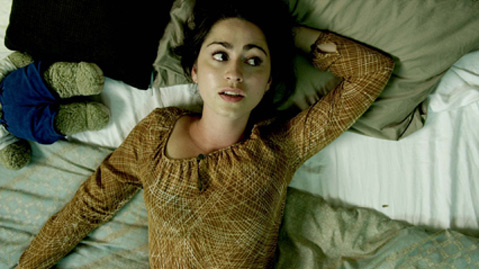This is Caroline
Director Danny Abel Talks Post-College Drama

Sure, college is a crazy place, but the real drama happens after graduation. In Danny Abel and Hannah Utt’s short, This is Caroline, the pair explores real world living for one hopeful twentysomething named — you guessed it — Caroline. The film opens up on a young beautiful girl as she navigates a booze-fueled house party, but things spiral out from there. A couple of drinks — and one accidental suicide attempt — later and Caroline’s world is flipped upside down, leaving our young heroine to rethink life as she knows it.
Here, we catch up with Abel to talk about the inspiration behind and the world beyond This is Caroline.
What was the inspiration behind This is Caroline?
Hannah Utt (Caroline’s screenwriter and lead actress) and I were fascinated by the terrifying post-collegiate moment where you realize how much the glossy personal narrative you’ve invented about yourself diverges from the reality of your life. It’s the kind of bratty, modern right of passage where you realize that in order to be an artist (or be successful in any field) you have to develop some actual skills, and how shocking and unpleasant that is. And probably the making of this film was an attempt to combat these same feelings of inadequacy that we found in ourselves.
Is she based on a real person?
The feelings that we were invoking were deeply personal, but the circumstances were purely fictional. We invented the conceit of the accidental wrist cutting as a way to show how different people’s perceptions of Caroline differed from her perceptions of herself (which then ultimately allows her to come to terms with her own feelings at the film’s conclusion).
Where/when did you guys shoot?
We shot in the Summer of 2011 in Brooklyn, New York.
The cinematography and editing are really impressive. Was there a specific mood or feel that you sought out?
Thanks! One of the constant discussions that I had with my DP Ben McIntire was about the visual ways to accentuate how each scene teetered between comedy and drama, and I think he did a great job with that. As for the overall narrative, I was really interested in using shot selection and pacing (as well as music and production design) to allow the audience to experience Caroline’s emotional life in order to explore numbness and the impulse to self destruct.
In your mind, what happens to Caroline after the credits role? Does her story get a happy or a sad ending?
Hah, well, it’s hard to say that the film ends on a particularly upbeat note, but the way we conceived the last scene is that it’s as much of a breakthrough as it is a breakdown. Whether or not this leads to her making different life choices is anyone’s guess, but it, at the very least, gives her a greater level of self awareness. … You know what? Fuck it. I think the day after the film ends she wins a puppy in a charity auction and miraculously gets a job at the New York Times. I’m sick of sad endings.
As a viewer, what draws you into a film?
I love films of all styles and genres, but I think the thing that ultimately draws me into a story is the degree to which the filmmaker succeeds in creating a cohesive world. I like films that seem to deliberately accomplish what the filmmaker sets out to do.
Is there a top five list of films that helped inform Caroline?
Well, creating “best of” lists makes me extremely anxious but there are definitely some films/filmmakers that inspired Caroline: 1. Five Easy Pieces; 2. Rachel Getting Married; 3. Erroll Morris; 4. Noah Baumbach; 5. David O. Russell
What’s next? Can we expect a full-length in the future?
Yes! Hannah and I are midway through a script about a suburban retiree who becomes a spiritual guru. We’re very excited about it!
This Is Caroline screens as part of the Santa Barbara Shorts on Thu., Jan. 31, 4:30 p.m,, at the Lobero Theatre and Sat., Feb. 2, 7 p.m., at the Museum of Art.



